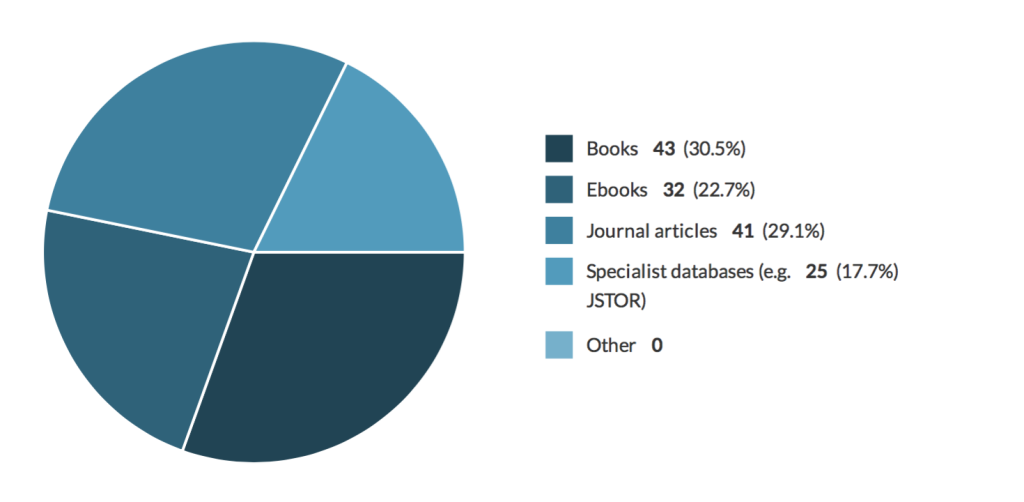We ran a survey in order to get an idea about resource use and reading lists of third year Sussex students. Students from a range of disciplines answered the survey and as you can see the highest numbers are present in our own subjects (Business, Geography and Psychology). This may be due to advertising it on our own social media including Facebook pages and groups and twitter. We also contacted Student Representatives, First-Generation Scholars and heads of departments.
We have done a similar survey in our first and second year in it will definitely be interesting to see how the answers change!
This year we received 49 responses from a variety of courses, the majority being from Psychology, BMF and Geography (Question 1).
Question 2 asked: Was your reading list available before the start of your final year?
Over 50% answered yes to this question up from first and second year (40% and 35% respectively). In our second year survey 25% of students didn’t look for a reading list similar to the figure this year at 22% showing that about a quarter of students do not actually look for a reading list before the start of the year.
2.a Of those who answered yes to the previous question (was your reading list available before the start of your final year?) 74.1% answered yes they did use it with 25.9% saying no they did not use it. This was a very similar figure to both first and second year survey results.
2.a. How did you decide which books to buy from the list?
The graph below shows that price and relevance to course were the most important to students when buying books from their reading lists. This has been a theme throughout all the surveys we have conducted. There is a huge contrast between first and third year however with 16 students in first year saying they bought all the books from their reading list. This year no one answered that they bought them all! This may be because students are reusing books from their first and second years or perhaps they are more selective with what to buy now.
2.a.i.a If you selected Other answers:
The majority of those who selected ‘Other’ believed that it wasn’t necessary to buy the books or that they would all be available in the library. One student found the books available online so did not purchase any and another student bought the books they were interested in (which wasn’t an option on the previous question).
2.a.ii – For those who did receive a reading list but decided not to use it answers:
Answers to this question were fairly equal but the most common was that the student thought they’d be able to access the books online. in the previous two years the most popular answer was that the student didn’t want to buy books before the year started. It may have changed in third year due to students feeling more confident using e-books and online resources and perhaps already having useful books from first and second year.
The second part of Question 2 asked whether students tried to get books for their course anyway and how. Just over half of participants (54.5%) said that they did and the method of doing this was using the library (40%), second-hand books (30%) or buying new books (20%). One participant stated that he/she used old module handbooks to find titles.
Those that hadn’t had their reading lists available and decided not to buy books for their course provided reasons as follows: Too expensive (33.3%), I thought I’d be able to access them online (33.3%), I thought I’d be able to get them from the library (16.7%), Didn’t think it would be necessary (8.3%), and Didn’t want to buy books before the course started (8.3%).
Question 3 enquired about academic resources: Are you using any of the following academic resources? Have you used these academic resources more or less than in previous years? Why do you think you are using these resources more often?
There is a fairly good mix when you look at the types of academic resources that 3rd years are using. The most popular are Books at 30.5% and Journal articles at 29.1%. However, these are closely followed by Ebooks at 22.7% and specialist databases at 17.7%. Unsurprisingly, 63.3% students felt that they are accessing these much more than previous years in their studies.
When considering why these resources are used more often, the overwhelming response is due to an increase of workload. Many student noted that more is expected of them in terms of recommended readings and independent research. For example, one respondent noted that “a lot more reading is set for each module and you are also required to read around the subject area more”.
Modules may also be more complex and one student said that “the reading really helps me with understanding modules”, but many are also finding the material more interesting. It is apparent that independent study is also more common as a number of respondent noted that they now search for their own sources.
Dissertations are also frequently mentioned as a reason for accessing more resources and this has influenced the choices of resource that some people make. For example, one respondent noted that “Concentrating on my thesis, so using lots of ebooks, also buying books that seem relevant for it”. One student also felt that they are now more effective at searching for material and have therefore found that it is a much faster process.
Overall most people now seem to be accessing more material from a wider range of sources for their course. This appears to be due to an increased workload, dissertations and a growing interest for their subject area.
With the last question, Question 4, we wanted to see whether students use different resources than the ones mentioned in previous questions.
Under Other people specified N/A, MTL Recorded lectures, None and Pocasts.




